I heard about this book on CBS Sunday Morning and I knew right away I needed to read this book.
‘If you are in Manhattan, traveling downtown on Fifth Avenue or Seventh Avenue, you can turn only left on Tenth Street. It’s a one-way street, west to east. Left on Tenth is my way home. I was left on Tenth when my husband died, and after that, life took many left turns. Some perilous, some wondrous. This book is about all of them.”
Left on Tenth, A Second Chance at Life
Left on Tenth, A Second Chance at Life is writer Delia Ephron’s recovery from the deaths of sister Nora and her husband Jerome Kass, her own battle with cancer, and her war with Verizon. Delia Ephron is a comedy writer, did I mention that?
Delia is the young sister of Nora Ephron, writer/director (You’ve Got Mail, Sleepless in Seattle) and the ex-wife of Carl Bernstein. Nora and Bernstein were married back in the 1970s and their marriage was used as the basis for Heartburn. Nora died of leukemia in 2012. Nora and Delia collaborated on several screenplays and other projects.
Nora Ephron may be a more familiar name than Delia, but Delia’s resume lists best sellers and successful films, among other projects. I knew of her work with Nora on several films, but had not read any of Delia’s solo projects. That is no longer the case.
I read about Nora’s passing when it happened and was shocked. She had kept her illness a secret, not wanting pity, but also not wanting the illness to prevent her from working. Nora’s death hit Delia hard, as one would expect of two close sisters. Delia’s husband Jerry got prostate cancer and he too passed after a long decline. Delia and Jerry were married for over 30 years.
If that wasn’t enough tragic, Delia’s dog Honey would also battle and die of cancer.
“If you’ve ever lost a dog, you know its a wipeout. But add to that my feeling that I’ve abandoned her, all that guilt and misery her ties to Jerry, my own fragile state on this earth. That’s a lot of combustion…She got me through that first year after Jerry died. Honey–my last link to Jerry and our life together.”
The best insurance and healthcare is no cancer-proof vest that makes one invincible. People get sick. Delia augments her journey with emails and text messages to and from her doctors, and her friends. The pain, frustration and relief in this book is honest and direct, but never does it descend into self-pity or melodrama. Good writers know when to edit themselves, even before book editors sharpen their pencils.
“Being faced with possibly fatal cancer has made me grateful for the love in my life, but it has not made me spiritual or religious. Still, I do feel that I was thrust into darkness and given back light. And it opened me up to feeling part of a larger world, I’m not sure why. Maybe because, in spite of being given a reprieve, it makes dying real. Like everyone else, I have a time here and it will be over.”
After her husband died, Delia was left to closeout and disconnect his life from the grid. This involved canceling a telephone landline. If his death was not painful enough, dealing with a phone carrier that failed multiple times to simply disconnect one of their landlines. This “simple” measure became so challenging (customer service, telephone menu prompts, processes), that Delia finally wrote an op-ed piece for The New York Times. Talk about a shared experience!
Naturally, the op-ed made Delia even more famous, and out of the many single men who contact her, one was a man who claimed that he had actually gone on a date or two with her, being set-up by sister Nora. This was fifty or so years ago and Nora had no memory of it. It turned out that this guy, Peter, was not a psycho. Ironically, he was a psychiatrist, who had also lost a spouse. A love affair eventually grew and these two people, who lived on opposite coasts, eventually married. Finding love twice in a lifetime, and especially after age 70, what a blessing!
After Nora’s illness, Delia began having her own blood monitored, with regular tests, as a precaution, since that type of leukemia tends to run in families. Results always came back normal, until it wasn’t. Leukemia. And so her new began.
Chemotherapy happened, but so did something else: marriage. Only four months after she fell in love, she got leukemia. Delia and Peter wasted no time, they got married in the hospital. Then the stem cell transplant procedure.
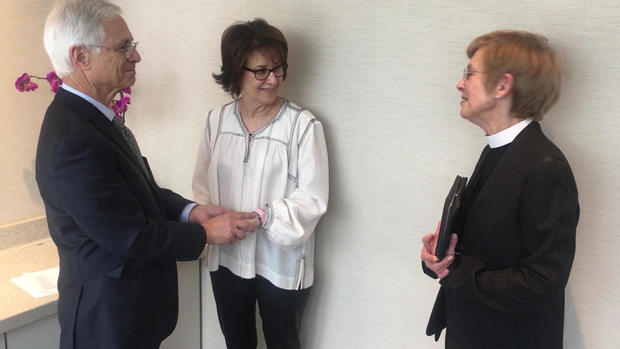
“I’m still nauseous and vomiting. In addition to these being chemotherapy effects, as Peter told Meredith, they are also symptoms of graft-versus-host disease, the donor cells attacking my gastro-intestinal tract. My body is fighting the transplant. Or, rather, the transplant is fighting my body.”
Given a 20 percent chance of survival, and the unbearable effects of the treatment, she felt the end was near. She wanted to die. She told her doctor, who asked for a little more time. She held on, and eventually she grew stronger. The recovery took a year and it shutdown her life in order to not catch even the simplest illness.
Delia underwent a bone marrow transplant from an adult donor and an umbilical cord blood transplant, a procedure not available just a few years earlier. Treatment options are evolving so quickly. The options Delia underwent were not available to Nora, just a few years earlier. Even the chemo drug was so new it did not have a permanent name yet.
Left in Tenth traces her medical and emotional journey as she navigates the healthcare system. Anyone dealing with a serious illness, or that of a loved-one, knows the challenges. It’s scary, all consuming and often emotionally sterile. Patients complain of compassionless processes, institutions and healthcare professionals. Finding attentive and caring doctors and nurses are a blessing.
Delia writes of finding both kinds, but thankfully more of the compassionate variety. One of the doctors caring for Delia even read one of her books. “He enjoy his patients and speaks of them with such respect. ‘Emergency medicine could never be for me.?’ he says. With transplants, he can follow his patients for years. He is very busy researching cures and saving lives, yet he finds time to read my novel Siracusa. He knows who I am. Not simply because he reengineered my bone marrow. He takes the trouble to know my brain and heart.”
Love can be a most powerful healing medicine. Maybe that is the real message in Left on Tenth.
“The truth is, falling in love isn’t something you have that much control over. If you fall in love, it’s because you’re open to it. I was open to it. Peter was open to it. There we were, and we do feel so lucky. In many ways it’s easier to fall in love in your 70s because you know who you are. My life has expanded because Peter’s in it. He’s interested in the stars, so we went to the total eclipse. I’ve had adventures and that’s been marvelous.”
Left on Tenth is not a celebrity bio, it is a journey of love and tenacity. Death hangs over Delia Ephron, it’s everywhere in the book, but so is love. In fact, when darkness reaches far inside our lives, love will shine the warmest. We just have to see it, and grab ahold.
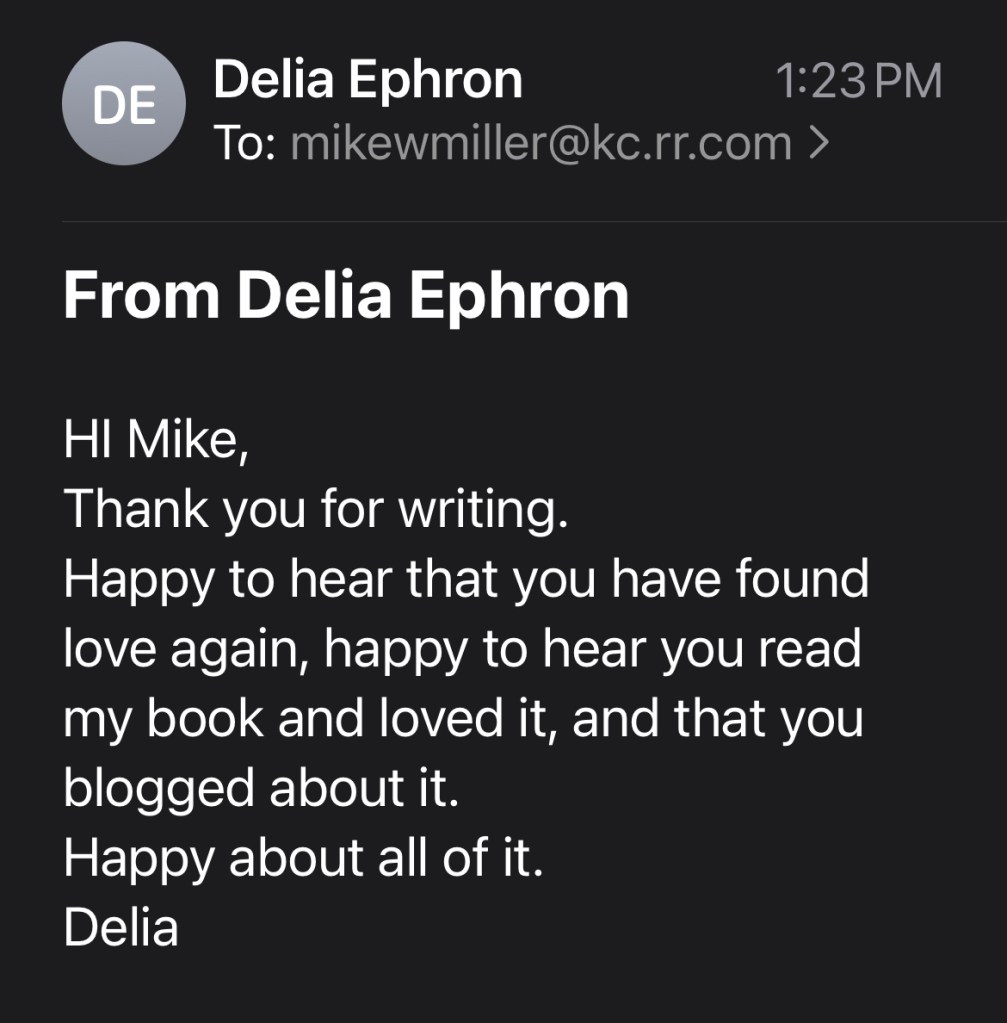
Here is the original story that aired on CBS.
https://www.cbsnews.com/news/delia-ephron-on-love-cancer-and-a-second-chance.

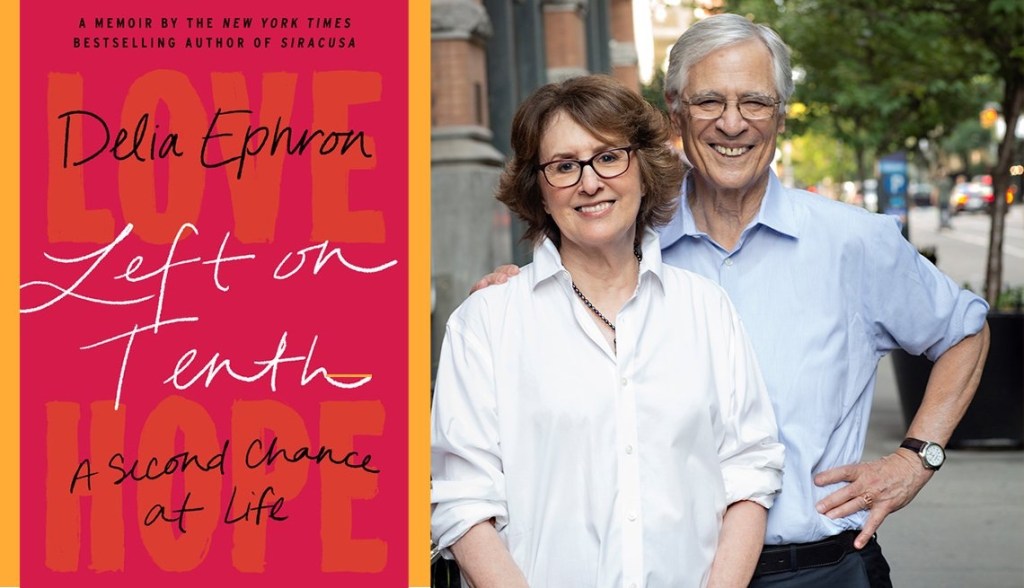

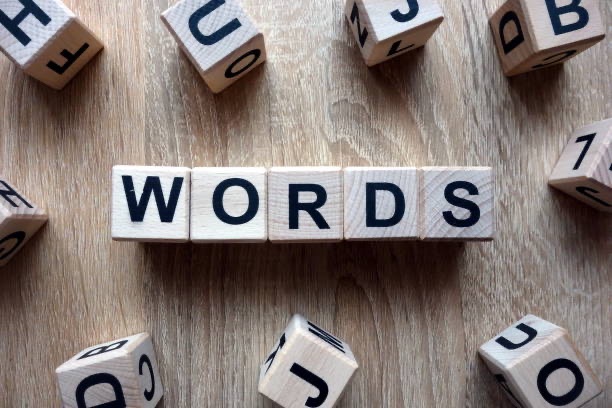
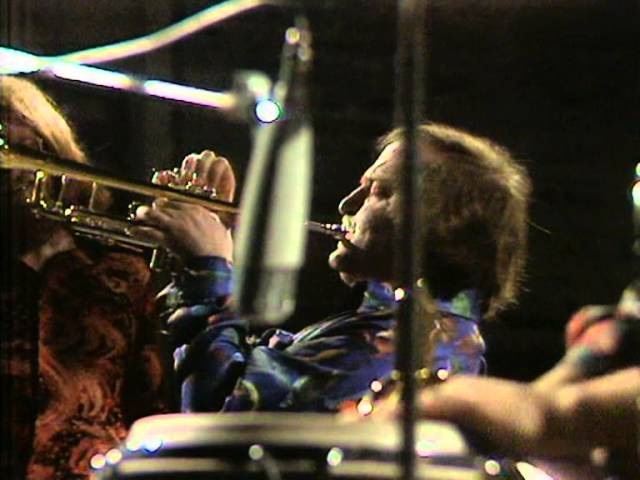

Leave a reply to Phil Strawn Cancel reply